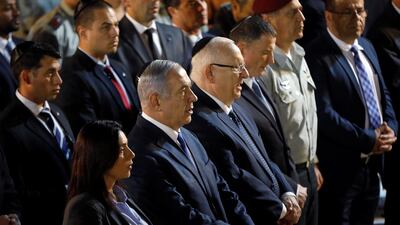Israeli President Reuven Rivlin has begun consultations with representatives of the new parliament's factions ahead of tapping the country's next prime minister.
The talks should be a formality, given the results of last week's general election. The ruling Likud and its traditional nationalist and Jewish ultra-Orthodox parties hold a 65-55 parliamentary majority and are expected to vouch for Israeli Prime Minister Benjamin Netanyahu.
He edged the opposition faction known as the Blue and White Party of Benny Gantz, the former Israeli military chief who once claimed to have bombed Gaza back “to the Stone Age”.
Mr Rivlin started his series of meetings on Monday with officials from Likud. He will then meet members of the 10 other elected factions, in order of largest to smallest, to hear their recommendations, before formally appointing the candidate he believes has the best chance of building a parliamentary majority.
In one of the president's few non-ceremonial roles, he asks that leader to form a government within 42 days. Intensive coalition negotiations could drag on for days or even weeks.
Mr Netanyahu will likely look to form one of the most right-wing governments in Israel’s history. He is set to enter into a coalition with a party known as Jewish power, a group of Jewish supremacists who call for violence against Arabs.
The results for Mr Netanyahu also came despite him being embroiled in three cases of corruption, accused of bribery, fraud and breach of trust. The country’s attorney general Avichai Mandelblit is set to indict him in all three cases after which he will have to face a hearing and attempt to stave off a fall from grace.
But he is now on the path to becoming Israel’s longest-ever serving leader. He has led Israel for a total of 13 years and will surpass the country’s founder David Ben-Gurion if he lasts until November.
In order to secure victory, Mr Netanyahu used fearmongering and bold promises to far-right settler factions.
Mr Netanyahu, in a campaign pledge just three days before polling day, vowed to begin annexing settlements in the occupied West Bank.
Applying sovereignty there on a large scale could effectively end remaining hopes for a two-state solution with the Palestinians.
He had also warned that Mr Gantz’ party would align with Arab parties in order to defeat him, spreading fear that Arabs would sit in the ruling coalition. In the 2015 election, he told voters that Arabs were heading to the polls “in droves” and therefore must get out to the ballot box.
He was widely condemned for the comments that were seen as treating Arabs as ‘the other’ and a group of people that Israelis should be scared of.

